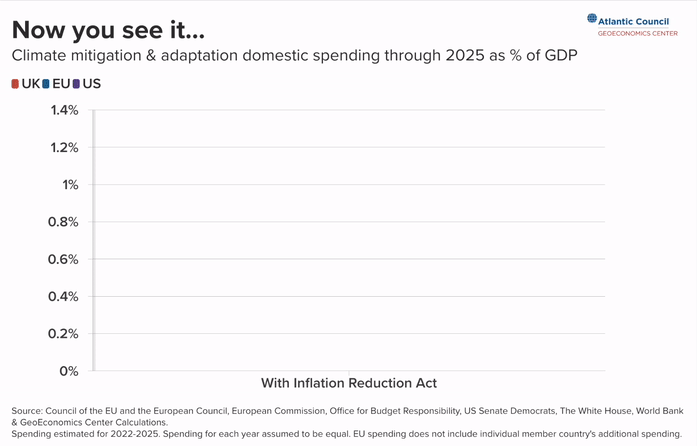US climate spending may soon match that of developed peers
The Inflation Reduction Act (IRA), signed into law by US President Joe Biden, will increase US domestic spending on climate adaptation and mitigation through 2025 by $130 billion. For years, the United States has been criticized for inaction on climate change compared to other developed countries. The IRA may provide reason enough to change this characterization.

By our calculations, the IRA will increase US spending on climate change mitigation as a percent of total gross domestic product (GDP) from an estimated .6 percent to 1.2 percent. With the United Kingdom and the European Union (EU) hovering around .97 percent and 1.38 percent, respectively, the United States will now be not only in within the same range, but spend more on climate as a percent of total GDP than the United Kingdom.
These calculations involve a few assumptions. Our calculations estimate domestic spending on climate adaptation for 2022-2025 based on budget commitments to energy spending and assume total spending is on average distributed equally in each year. Furthermore, EU spending does not take into account individual member countries’ additional spending. Still, exceeding the benchmark provided by the United Kingdom is a milestone for the United States.
With these assumptions, the concrete commitments in the bill remain a step forward for the United States in addressing climate adaption. According to estimates from Rhodium Group, the bill could cut US net greenhouse gas emissions anywhere from 31 to 44 percent below 2005 levels by 2030. Although it still falls short of the United States’ goal to cut emissions by 50 to 52 percent, the IRA marks an escalation.
You may be hearing a version of that statistic throughout the fall in the lead-up to the United Nations Climate Change Conference of the Parties (COP27).
Sophia Busch is a Program Assistant with the GeoEconomics Center.
Carrie Hsu is a Young Global Professional with the GeoEconomics Center.

At the intersection of economics, finance, and foreign policy, the GeoEconomics Center is a translation hub with the goal of helping shape a better global economic future.
Image: Wind power and solar power stations